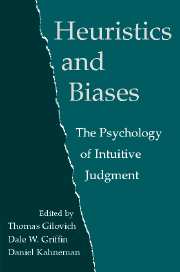Book contents
- Frontmatter
- Contents
- List of Contributors
- Preface
- Introduction – Heuristics and Biases: Then and Now
- PART ONE THEORETICAL AND EMPIRICAL EXTENSIONS
- 1 Extensional versus Intuitive Reasoning
- 2 Representativeness Revisited: Attribute Substitution in Intuitive Judgment
- 3 How Alike Is It? versus How Likely Is It?: A Disjunction Fallacy in Probability Judgments
- 4 Imagining Can Heighten or Lower the Perceived Likelihood of Contracting a Disease: The Mediating Effect of Ease of Imagery
- 5 The Availability Heuristic Revisited: Ease of Recall and Content of Recall as Distinct Sources of Information
- 6 Incorporating the Irrelevant: Anchors in Judgments of Belief and Value
- 7 Putting Adjustment Back in the Anchoring and Adjustment Heuristic
- 8 Self-Anchoring in Conversation: Why Language Users Do Not Do What They “Should”
- 9 Inferential Correction
- 10 Mental Contamination and the Debiasing Problem
- 11 Sympathetic Magical Thinking: The Contagion and Similarity “Heuristics”
- 12 Compatibility Effects in Judgment and Choice
- 13 The Weighing of Evidence and the Determinants of Confidence
- 14 Inside the Planning Fallacy: The Causes and Consequences of Optimistic Time Predictions
- 15 Probability Judgment across Cultures
- 16 Durability Bias in Affective Forecasting
- 17 Resistance of Personal Risk Perceptions to Debiasing Interventions
- 18 Ambiguity and Self-Evaluation: The Role of Idiosyncratic Trait Definitions in Self-Serving Assessments of Ability
- 19 When Predictions Fail: The Dilemma of Unrealistic Optimism
- 20 Norm Theory: Comparing Reality to Its Alternatives
- 21 Counterfactual Thought, Regret, and Superstition: How to Avoid Kicking Yourself
- PART TWO NEW THEORETICAL DIRECTIONS
- PART THREE REAL-WORLD APPLICATIONS
- References
- Index
5 - The Availability Heuristic Revisited: Ease of Recall and Content of Recall as Distinct Sources of Information
from PART ONE - THEORETICAL AND EMPIRICAL EXTENSIONS
Published online by Cambridge University Press: 05 June 2012
- Frontmatter
- Contents
- List of Contributors
- Preface
- Introduction – Heuristics and Biases: Then and Now
- PART ONE THEORETICAL AND EMPIRICAL EXTENSIONS
- 1 Extensional versus Intuitive Reasoning
- 2 Representativeness Revisited: Attribute Substitution in Intuitive Judgment
- 3 How Alike Is It? versus How Likely Is It?: A Disjunction Fallacy in Probability Judgments
- 4 Imagining Can Heighten or Lower the Perceived Likelihood of Contracting a Disease: The Mediating Effect of Ease of Imagery
- 5 The Availability Heuristic Revisited: Ease of Recall and Content of Recall as Distinct Sources of Information
- 6 Incorporating the Irrelevant: Anchors in Judgments of Belief and Value
- 7 Putting Adjustment Back in the Anchoring and Adjustment Heuristic
- 8 Self-Anchoring in Conversation: Why Language Users Do Not Do What They “Should”
- 9 Inferential Correction
- 10 Mental Contamination and the Debiasing Problem
- 11 Sympathetic Magical Thinking: The Contagion and Similarity “Heuristics”
- 12 Compatibility Effects in Judgment and Choice
- 13 The Weighing of Evidence and the Determinants of Confidence
- 14 Inside the Planning Fallacy: The Causes and Consequences of Optimistic Time Predictions
- 15 Probability Judgment across Cultures
- 16 Durability Bias in Affective Forecasting
- 17 Resistance of Personal Risk Perceptions to Debiasing Interventions
- 18 Ambiguity and Self-Evaluation: The Role of Idiosyncratic Trait Definitions in Self-Serving Assessments of Ability
- 19 When Predictions Fail: The Dilemma of Unrealistic Optimism
- 20 Norm Theory: Comparing Reality to Its Alternatives
- 21 Counterfactual Thought, Regret, and Superstition: How to Avoid Kicking Yourself
- PART TWO NEW THEORETICAL DIRECTIONS
- PART THREE REAL-WORLD APPLICATIONS
- References
- Index
Summary
According to Tversky and Kahneman's (1973, p. 208) availability heuristic, individuals estimate the frequency of an event or the likelihood of its occurrence “by the ease with which instances or associations come to mind.” Although this heuristic has stimulated an enormous amount of research (see Sherman & Corty, 1984; Taylor, 1982, for reviews), the classic studies on the issue are ambiguous with regard to the underlying process. For example, in one of the better known studies, Tversky and Kahneman (1973, Experiment 3) observed that participants overestimated the number of words that begin with the letter r, but underestimated the number of words that have r as the third letter. They presumably did so because words that begin with a certain letter can be brought to mind more easily than words that have a certain letter in the third position. Note, however, that this differential ease of recall may influence participants' frequency estimates in two different ways. On one hand, participants may use the subjective experience of ease or difficulty of recall as a basis of judgment, as suggested by Tversky and Kahneman's (1973) description of the availability heuristic. If so, they would estimate a higher frequency if the recall task is experienced as easy rather than difficult. On the other hand, they may recall as many words of each type as possible within the time allotted to them and may base their judgment on the recalled sample of words.
Information
- Type
- Chapter
- Information
- Heuristics and BiasesThe Psychology of Intuitive Judgment, pp. 103 - 119Publisher: Cambridge University PressPrint publication year: 2002
Accessibility standard: Unknown
Why this information is here
This section outlines the accessibility features of this content - including support for screen readers, full keyboard navigation and high-contrast display options. This may not be relevant for you.Accessibility Information
- 97
- Cited by
